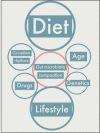Association between the Gut Microbiota and Obesity
- PMID: 31406553
- PMCID: PMC6684436
- DOI: 10.3889/oamjms.2019.586
Association between the Gut Microbiota and Obesity
Abstract
Background: People co-evolved with members of the microbiota and developed, used and adapted many complex immune mechanisms, which are used for monitoring and control of the microbiota. The gut microbiota in cooperation with humans became its essential part, so-called "hidden organ" with many important and indispensable functions. Quantitative and/or qualitative deficiency of the gut microbiota (dysbiosis) probably is a basis of many disorders, including obesity.
Aim: To present an overview of the possible association between gut microbiota and obesity.
Methods: Meta-analysis of available scientific and published data including PubMed, Web of Science, Scopus and Cochrane Library.
Results: In the intestinal microbiota at obese people is detected a specific increase in the proportion between class Firmicutes and Bacteroidetes despite the non-obese people. Also, it is detected a decrease in this proportion if the person lost weight. These facts may be secondary to obesity. The colonisation of germ-free mice with microbiota from ordinarily feed or obese mice, without changes in the feed style leads to increase body fat to more than 50%.
Conclusion: The human gut microbiota directly affects the food digestion, absorption and metabolism. The gut microbiota of obese people has a higher capacity for receiving energy from the food than the microbiota at slim people. The gut microbiota affects appetite control and energy balance. Lifestyle and food regimen affect the diversity of the gut microbiota and the presence of dysbiosis.
Keywords: association; gut; microbiota; obesity.
Figures





Similar articles
-
Changes seen in gut bacteria content and distribution with obesity: causation or association?Postgrad Med. 2015;127(8):863-8. doi: 10.1080/00325481.2015.1098519. Epub 2015 Oct 16. Postgrad Med. 2015. PMID: 26474235 Review.
-
Gut microbiota-derived metabolites in obesity: a systematic review.Biosci Microbiota Food Health. 2020;39(3):65-76. doi: 10.12938/bmfh.2019-026. Epub 2020 Feb 13. Biosci Microbiota Food Health. 2020. PMID: 32775123 Free PMC article. Review.
-
Gut microbiota mediates the protective effects of dietary β-hydroxy-β-methylbutyrate (HMB) against obesity induced by high-fat diets.FASEB J. 2019 Sep;33(9):10019-10033. doi: 10.1096/fj.201900665RR. Epub 2019 Jun 5. FASEB J. 2019. PMID: 31167080
-
Diet-driven microbiota dysbiosis is associated with vagal remodeling and obesity.Physiol Behav. 2017 May 1;173:305-317. doi: 10.1016/j.physbeh.2017.02.027. Epub 2017 Feb 27. Physiol Behav. 2017. PMID: 28249783 Free PMC article.
-
Influence of high-fat diet on gut microbiota: a driving force for chronic disease risk.Curr Opin Clin Nutr Metab Care. 2015 Sep;18(5):515-20. doi: 10.1097/MCO.0000000000000209. Curr Opin Clin Nutr Metab Care. 2015. PMID: 26154278 Free PMC article. Review.
Cited by
-
A Keystone Gut Bacterium Christensenella minuta-A Potential Biotherapeutic Agent for Obesity and Associated Metabolic Diseases.Foods. 2023 Jun 26;12(13):2485. doi: 10.3390/foods12132485. Foods. 2023. PMID: 37444223 Free PMC article. Review.
-
Programming Factors of Neonatal Intestinal Dysbiosis as a Cause of Disease.Int J Mol Sci. 2023 Mar 17;24(6):5723. doi: 10.3390/ijms24065723. Int J Mol Sci. 2023. PMID: 36982799 Free PMC article. Review.
-
Lantibiotics Produced by Oral Inhabitants as a Trigger for Dysbiosis of Human Intestinal Microbiota.Int J Mol Sci. 2021 Mar 25;22(7):3343. doi: 10.3390/ijms22073343. Int J Mol Sci. 2021. PMID: 33805848 Free PMC article.
-
Effectiveness and safety of different academic schools of traditional Chinese medicine in the treatment of obesity: A protocol for systematic review and meta-analysis.Medicine (Baltimore). 2022 Dec 9;101(49):e31960. doi: 10.1097/MD.0000000000031960. Medicine (Baltimore). 2022. PMID: 36626424 Free PMC article.
-
Brief overview of dietary intake, some types of gut microbiota, metabolic markers and research opportunities in sample of Egyptian women.Sci Rep. 2022 Oct 14;12(1):17291. doi: 10.1038/s41598-022-21056-z. Sci Rep. 2022. PMID: 36241870 Free PMC article.
References
-
- De Clercq NC, Groen AK, Romijn JA, Nieuwdorp M. Gut Microbiota in Obesity and Undernutrition. The Advances in Nutrition journal. 2016;15(7(6)):1080–1089. https://doi.org/10.3945/an.116.012914 PMid:28140325 PMCid:PMC5105041. - PMC - PubMed
-
- Parekh PJ, Arusi E, Vinik AI, Johnson DA. The role and influence of gut microbiota in pathogenesis and management of obesity and metabolic syndrome. The Frontiers in endocrinology journal. 2014;5:47. https://doi.org/10.3389/fendo.2014.00047 PMid: 24778627 PMCid:PMC3984999. - PMC - PubMed
-
- Bäckhed F, Manchester JK, Semenkovich CF, Gordon JI. Mechanisms underlying the resistance to diet induced obesity in germ-free mice. Proceedings of the National Academy of Sciences of the United States of America. 2007;104(3):979–84. https://doi.org/10.1073/pnas.0605374104 PMid:17210919 PMCid:PMC1764762. - PMC - PubMed
-
- Turnbaugh PJ, Ley RE, Mahowald MA, Magrini V, Mardis ER, Gordon JI. An obesity-associated gut microbiome with increased capacity for energy harvest. Nature. 2006;444(7122):1027–31. https://doi.org/10.1038/natur.e05414 PMid:17183312. - PubMed
-
- Ridaura VK, Faith JJ, Rey FE, Cheng J, Duncan AE, Kau AL, Griffin NW, Lombard V, Henrissat B, Bain JR, Muehlbauer MJ, Ilkayeva O, Semekovich CF, Funai K, Hayashi DK, Lyle BJ, Martini MC, Ursell LK, Clemente JC, Van Treuren W, Walters WA, Knight R, Newgard CB, Heath AC, Gordon JI. Gut microbiota from twins discordant for obesity modulate metabolism in mice. Science. 2013;341(6150):1241214. https://doi.org/10.1126/science.1241214 PMid:24009397 PMCid:PMC3829625. - PMC - PubMed
Publication types
LinkOut - more resources
Full Text Sources
Research Materials
